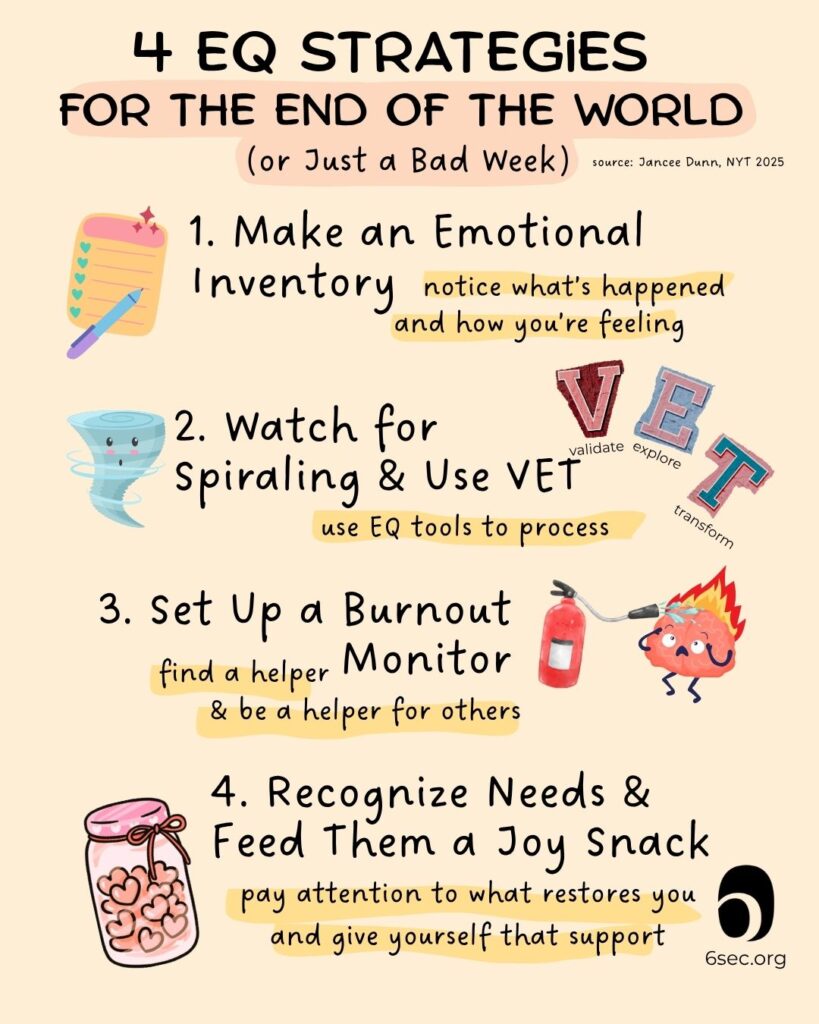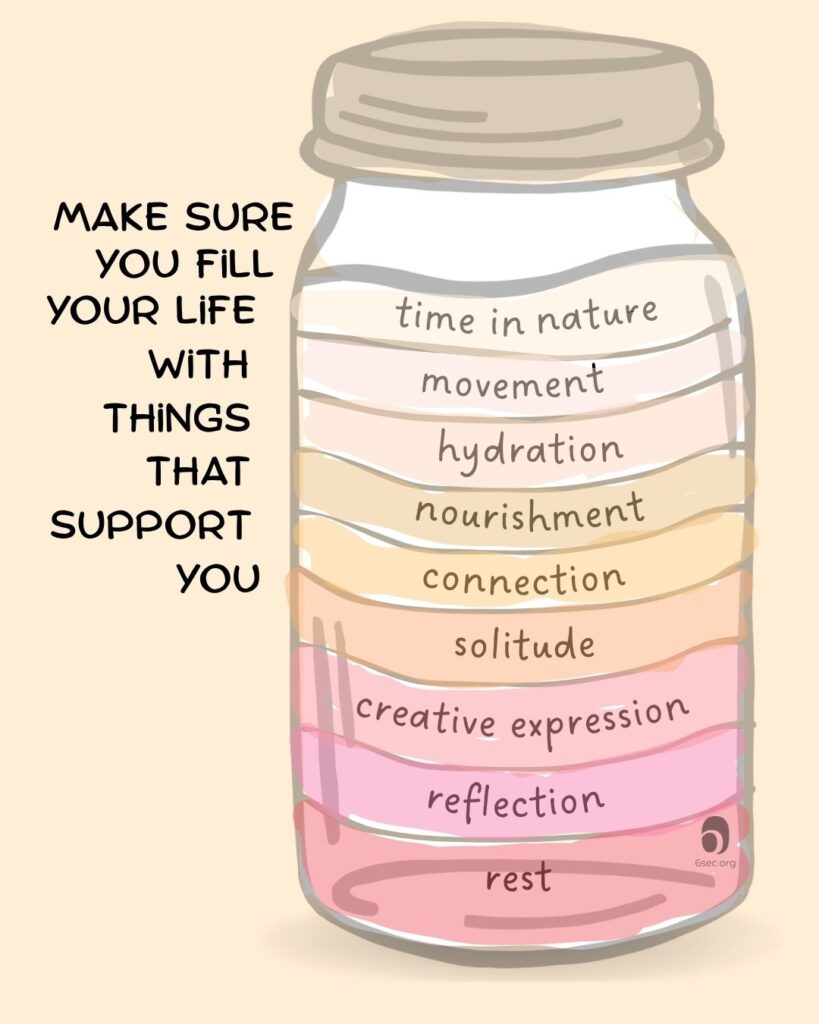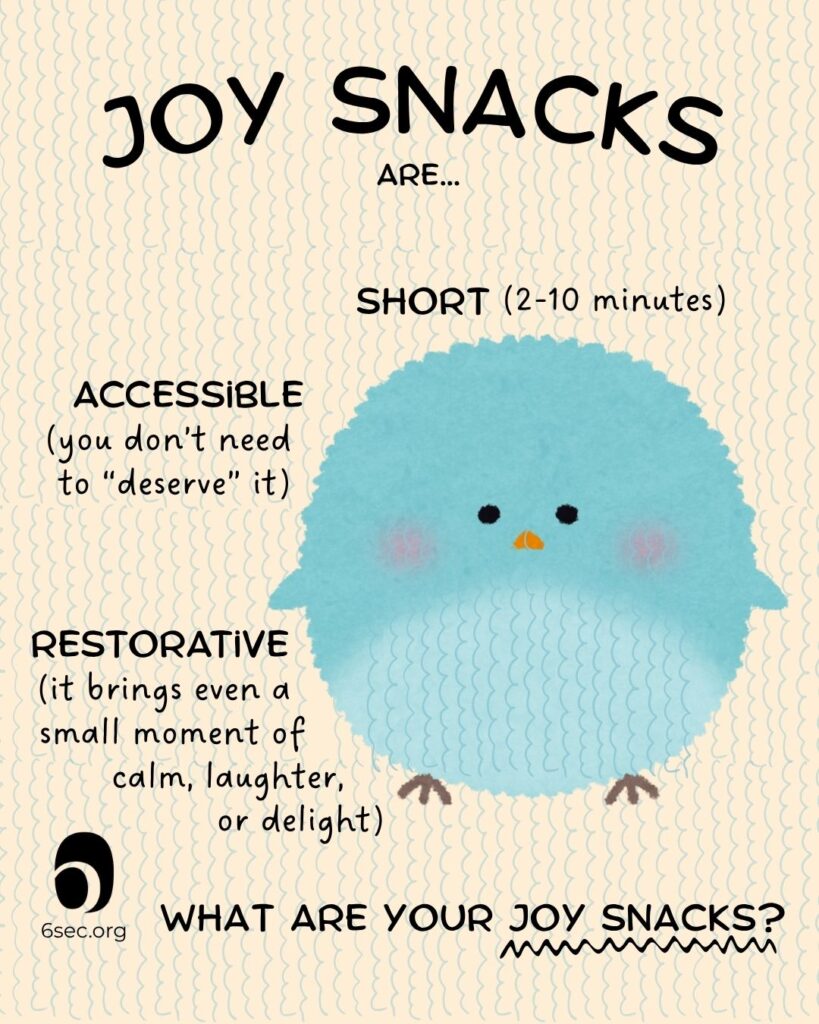
Stressed Out? 4 EQ Strategies for the End of the World (or Just a Bad Week)
Whether you’re facing a personal setback, ongoing stress, or just a tough week, emotional intelligence can help. When life feels overwhelming, it’s tempting to power through and ignore how you’re really doing but EQ offers a more sustainable path. It starts with noticing what’s happening inside and choosing to respond with intention. Inspired by a recent piece in The New York Times on how to survive a crisis, we’ve expanded four powerful strategies with emotional intelligence to help you move through hard times with more clarity, intention, and care for ourselves and others.
by Patty Freedman
1. Make an Emotional Inventory
After a crisis, we’re often told to “move on” from our losses, but healing starts by facing what’s actually happened. In disaster response, making an inventory means counting the damage, but for our emotional world, it means acknowledging what we’ve felt and lost. The process of taking inventory can help you embrace what you have been through so you can start the grieving process, begin healing or rebuilding. Psychological models of grief highlight the importance of consciously acknowledging both our emotional loss and making practical changes to begin healthy recovery.
When we give ourselves permission to feel our feelings, we begin to rebuild.
Try this reflection: What emotions have I experienced — frustration, fear, disappointment, relief, grief, gratitude? What are those emotions telling me? You might use this TFA Cards Deck to sort your feelings and see the bigger picture <Try our new interactive TFA Cards App here or get the physical deck on the EQ store here> — or just grab a notebook and begin.

2. Watch for Spiraling — and Use VET Instead
It’s easy to get stuck asking, “Why did this happen?” or saying “It’s just not fair”
While meaning-making is part of growth, rumination and spiraling can keep us trapped.
Research confirms that meaning-making is a crucial part of coping with adversity and trauma. Park (2010) notes that finding meaning after a difficult event is associated with improved psychological adjustment and resilience.
But rumination—repetitive, passive focus on distress and its causes—has been shown to worsen emotional outcomes. Nolen-Hoeksema (2000) found that rumination predicts longer and more intense depressive episodes, anxiety, and post-traumatic stress. It keeps us stuck in cycles of self-blame and distress without leading to problem-solving or emotional resolution.
The key difference is purposeful reflection. Emotional intelligence tools like VET (Validate, Explore, Transform) help process emotions and uncover meaning without spiraling. Instead of looping on “Why me?” navigate that gap, allowing yourself to process feelings and uncover insights without getting caught in loops of suffering.
Try the VET process:
Validate. Explore. Transform.
This tool helps you honor your emotions and uncover what they’re telling you — so you can move forward, not just dwell.
🧠 Try it now with the VET Tool in the Cards App, a hands-on way to process tough emotions with clarity and insight.
3. Set Up a Burnout Monitor
Burnout rarely announces itself—it creeps in quietly over time. Research shows burnout often has an insidious onset, developing gradually before it becomes noticeable. That’s why sometimes we need someone else to notice before we do.
In workplace research, a 2023 study of line managers found they play a vital early role in “picking up signals” that an employee is heading toward burnout and intervening before it becomes a crisis. This Harvard Business Review article on employee burnout highlights the role of manager’s deep listening and emotional awareness in prevention; these are both key aspects of emotional intelligence.
A recent case study with Six Seconds and NHS used EQ coaching to reduce burnout levels with healthcare workers. Results indicated A 35% improvement in emotional intelligence skills fueled a 27.6% increase in wellbeing.
Ask someone in your life to be your Burnout Monitor. Let them know it’s okay to check in on you, even when you seem fine. This kind of support relies on emotional intelligence: trust, empathy, and the ability to name what might otherwise stay hidden.
You can also be that person for someone else. It’s a small act of service and a powerful way to show up with EQ.
Check out Burnout Signs, Definition & EQ Solutions for a deeper dive into how EQ directly addresses the roots of burnout.
4. Recognize Hidden Needs — and Feed Them
Hard times drain us in ways we don’t always notice. That’s why it’s essential to know what restores you — and give yourself more of it. This is part of Know Yourself in the Six Seconds Model — building the awareness to notice when your energy is low, when you’re off balance, and what truly helps you recharge. Restorative moments can be: rest, movement, plenty of water and nourishing food, time in nature, music, laughter, creative self expression, connection with friends, quiet solitude, or moments of joy.
We call these Joy Snacks — small, accessible experiences that bring you back to yourself. They don’t fix everything, but they shift your chemistry and remind you that you’re still here, still capable of feeling something good.
How Joy Snacks work:
Dopamine is a neurotransmitter that plays a crucial role in how we feel pleasure. It’s a big part of our unique human ability to think and plan. It helps us strive, focus, and find things interesting. When you engage in an activity you enjoy, your brain releases dopamine. This makes you feel good and motivates you to repeat the activity, reinforcing the behavior.
Benefits of Regular Joy Snacking:
The idea behind joy snacking is to intentionally engage in these activities regularly to increase these moments of happiness and the associated dopamine release. Regularly experiencing these small bursts of joy can improve overall mood, reduce stress, and enhance emotional resilience. Making joy-snacking a habit can cultivate a more positive and balanced emotional state.
Greater Good Science researched Joy Snacks and found practicing Joy Snacks for 7 days resulted in:
26% increase in Emotional well-being
23% increase in self reported positive emotions
27% more likely to feel empowered to become happier
30% People say relationships improved
12% increase in overall sleep quality
🧃 Create your own list of Joy Snacks?
A Joy Snack is…
- Short (2-10 minutes)
- Accessible (you don’t need to “deserve” it)
- Restorative (it brings even a small moment of calm, laughter, or delight)
Try this:
What’s one small thing that made you smile last week? What helps you breathe deeper?


Get your JOY SNACK worksheet by filling out the form!
For more articles, I recommend:
- Stressed Out? 4 EQ Strategies for the End of the World (or Just a Bad Week) - June 23, 2025
- Making EQ Visible = Making Impact - May 26, 2025
- How to Make Stress Work for You - April 27, 2025
